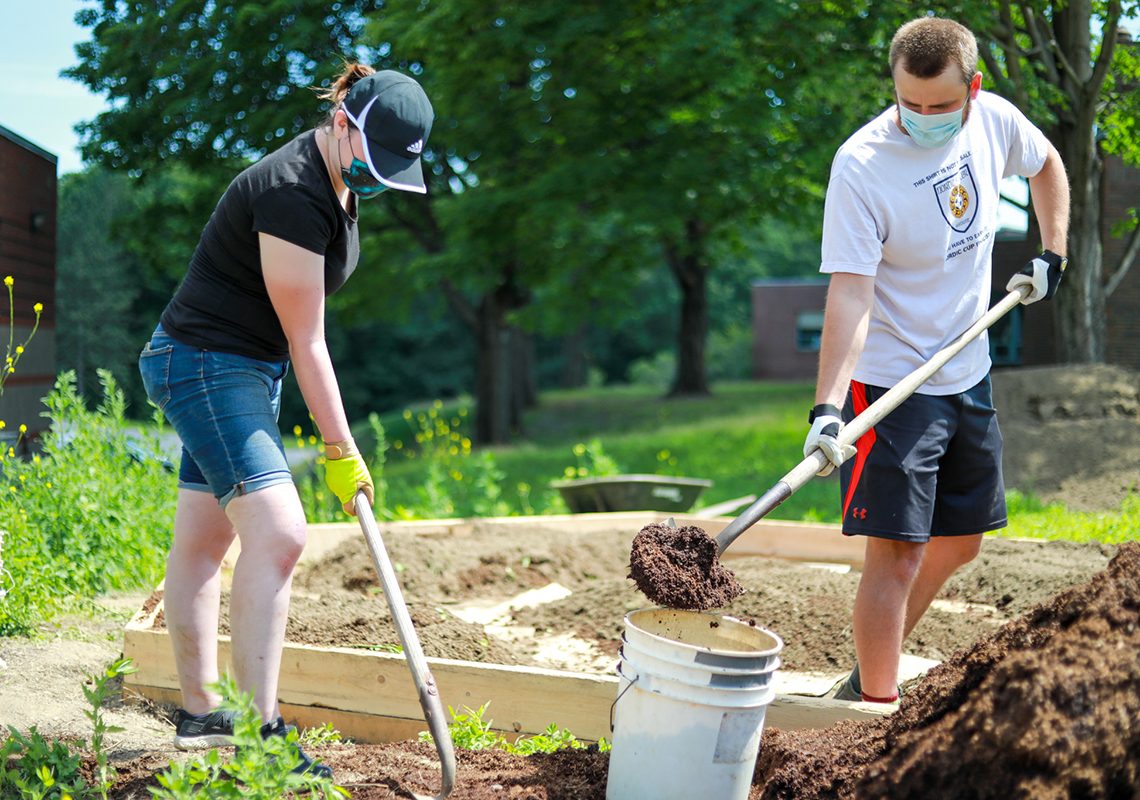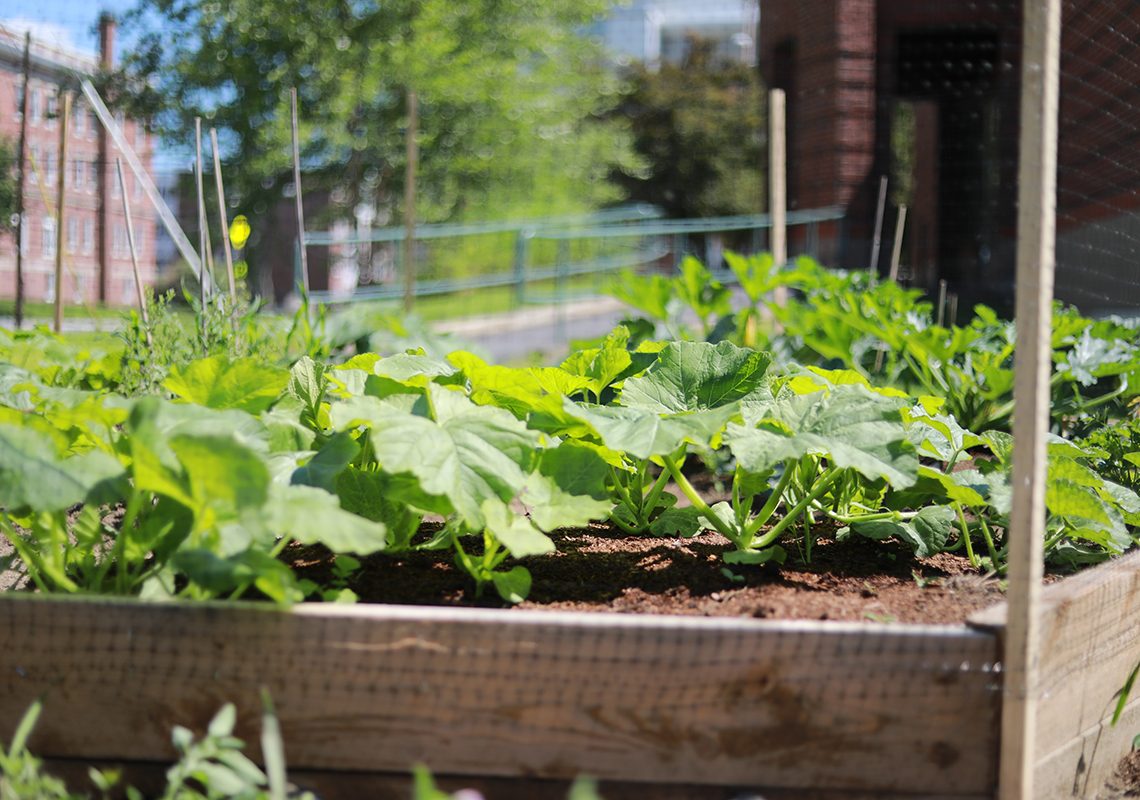FARMINGTON, ME (August 4, 2020)—The University of Maine at Farmington has put the community into community garden with several popular web-based May and summer courses where students not only studied what it takes to create a small-scale garden, but also created and implemented plans to build raised beds on campus to provide fresh produce for food-insecure students and community partners.
“Dig-it-all! Gardens & Community,” is an English course that delves into the literature and practice of what it takes to create small-scale, sustainable organic gardens. Students enrolled ranged from pre-college to college seniors, with majors from community health to creative writing to biology.
 Left to right: Sara Taylor and James Cooke, UMF work-initiative students, helped create campus raised beds in addition to creating short videos and online drawings of the garden creation process.
Left to right: Sara Taylor and James Cooke, UMF work-initiative students, helped create campus raised beds in addition to creating short videos and online drawings of the garden creation process.
The UMF Community Garden has been a dream of students, staff and faculty for several years. The idea inspired faculty members Misty Beck and Gretchen Legler to work together to create a course focused on getting UMF’s first campus garden designed, built, planted, tended and harvested, all while learning remotely.
“Given the challenges of COVID-19 and developing a garden from afar, the students have done a great job at drafting a design for the green space,” said Beck. “They created a list of potential donors to match the materials needed, and put together a proposal featuring our shared values and design around accessibility, community and food security.”
The project has also recently been award a $6,300 grant from the Ella Lyman Cabot Trust in Boston to support the building of the garden.
The garden features student-designed raised beds growing a variety of vegetables and herbs. Hexagonal, U-shaped, mini and elevated beds were designed to improve productivity and accessibility of the approximate 2,700 square foot space.
 The UMF Community garden features student-designed raised beds growing a variety of vegetables and herbs.
The UMF Community garden features student-designed raised beds growing a variety of vegetables and herbs.
UMF faculty, students and Facilities Management staff have been building the raised beds, filling them with soil and planting seeds and seedlings. One bed was recently planted with the “three sisters” (corn, beans, and squash), along with some companion herbs. And like any Maine garden, new items are being planted all the time, including donated plants and seeds. “You bring it and we’ll grow it,” Legler said.
Community values are embedded throughout the program. Students studying remotely participated in online class time, designed the campus garden and created an at-home community garden project. Also, food harvested from the Farmington campus garden will be donated to campus and off-campus food banks.
“We were also fortunate in hiring two work-initiative students for the summer to help us grow the garden,” said Legler. “They’ve already been instrumental in helping to implement the class’s designs. James Cooke, an Environmental Policy and Planning major from Lyme, N.H., has been working on creating the online drawings and materials lists. Sara Taylor, an artist working in new media from Farmington, has created two short videos for the archives as well as begun work on social media visibility.”
In addition, UMF faculty member Bud Martin and Agriculture Professional Dave Fuller from the UMaine Cooperative Extension have written a grant to bring Maine Hunger Dialogue to the UMF campus in the fall. A collaboration between Maine Campus Compact and the Cooperative Extension, the dialogue’s main objective is to take action to end hunger in the State of Maine.
This fall, Beck and Legler will be offering “Gardening for Change,” a project-based Honors course that will study restorative agriculture, food justice and food networks and take students on virtual tours of innovative agricultural enterprises in Maine.
“I feel very strongly that students at UMF can benefit from having hands-on experiences with growing food, not only for the educational benefit, but for the emotional, physical and spiritual benefit,” said Legler. “Gardens are perfect spaces to reflect upon our relationship with the larger animate world, as well as places to learn about equality, justice, community, how to pay attention to small things, and, of course, a place to learn all manner of things related to the natural sciences.”
# # #
EDITOR’S NOTE:
Link to image on WordPress: https://www.umf.maine.edu/wp-content/uploads/sites/1/2020/08/RP190-075A.jpg
Photo Caption: Left to right: Sara Taylor and James Cooke, UMF work-initiative students, helped create campus raised beds in addition to creating short videos and online drawings of the garden creation process.
Photo Credit: UMF Image
Link to image on WordPress: https://www.umf.maine.edu/wp-content/uploads/sites/1/2020/08/RP190-075B.jpg
Photo Caption: The UMF Community garden features student-designed raised beds growing a variety of vegetables and herbs.
Photo Credit: UMF Image
April Mulherin
UMF Associate Director for Media Relations
office: 207-778-7081
cell: 207-491-0064
april.mulherin@maine.edu

